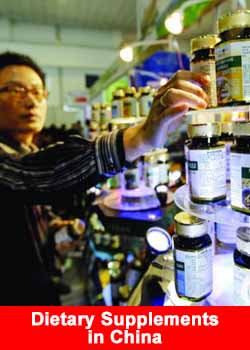Direct Selling Makes Up 70% of China’s Dietary Supplements Market

China’s market for dietary supplements, valued at about 100 billion yuan ($16 billion) in 2014, grew by 12%, from 89.2 billion yuan a year before, according to research consultants Frost & Sullivan. Figures from the China Health Care Association are even more buoyant, showing the industry growing an average of 10% to 15% each year from 2010 to 2014, with sales expanding from 260 billion to 400 billion yuan.
“A positive industrial environment in the last five years also has driven the fast growth,” says Neil Wang, global partner and China managing director at Frost & Sullivan, confirming that the nutrition and health industry is now a part of the national economic development plan.
About 70% of China’s dietary supplements are purchased from direct sellers, led by Amway and its mostly female distributor base of approximately 250,000.
As early as 2003, this positive development propelled China to Amway’s top market. Frost & Sullivan estimates that Amway holds an 11% share of the overall market, and 20% in the direct selling segment. Avon was also granted approval by China’s Ministry of Commerce in 2008 to include health food in the scope of its direct selling business. This move made Avon the second direct selling enterprise after Amway to extend its business scope upon obtaining the relevant license.
Chinese authorities rely on a cumbersome product-registration process to monitor the quality of each supplement that is made or sold in its market. But China is taking at least one step closer to the United States, where supplements are rather loosely regulated.
Exactly what modern elixirs do the Chinese consumers favor? Plenty of protein powder, calcium supplements, laxatives, vitamin E and weight loss products, the five most popular blockbusters, in that order, according to the latest national audit by IMS Health, whose figures exclude over-the-counter pharmacies
Come October, a new automatic filing system will exempt ingredients and products previously approved from repeated – and costly – laboratory tests and regulatory hoops. But newly imported supplements, or those made with new ingredients, will still have to pass through the same old regime, which takes at least two years to complete. This promises an uphill battle for foreign players, such as NBTY or GNC Holdings, that seek to introduce new products.
“The entry barriers for foreign competitors will remain high. The short-term impact will be good for domestic players like us,” says Liang Yunchao, chairman of By-health, the leader in retail sales.
China is currently ranked No.2 in the global direct selling market contributing 23.3% sales to global industry revenues, according to Direct Selling News billion-dollar markets report. The report also notes that if the current rates of growth in the United States and China remain steady, China could become the No. 1 direct selling market in the next year or two.
Source: Forbes